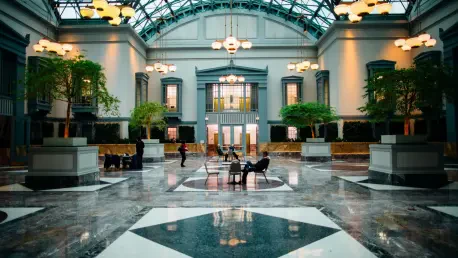In a luxurious hotel lobby, a traveler stands at an automated check-in kiosk. The check-in is seamless and quick, yet something is missing—a warm smile from a receptionist, a personal greeting, a human touch. As artificial intelligence systems become increasingly prevalent in hospitality, a crucial question emerges: Can technological efficiency coexist with personalized guest experiences?
Why AI is Crucial in Today’s Hospitality Industry
The intersection of hospitality and AI technology has transformed in recent years. Rapid advancements in technology have propelled the industry into a new era, characterized by solutions aimed at reducing staffing costs, streamlining operations, and meeting the evolving expectations of guests who desire both speed and personal engagement. The need for personalization is paramount, as the modern guest demands unique and tailored experiences. Yet, the challenge remains how to harmonize the efficiency brought by AI with the deeply rooted human elements that drive guest satisfaction.
Understanding the Mechanics of AI in Hotels
AI in hospitality offers unparalleled efficiency. It reduces wait times, provides round-the-clock assistance, and supports multiple languages, all of which enhance the operational spectrum. However, personalization is where AI systems often fall short. While adept at logistics, AI lacks the emotional intelligence essential for grasping nuanced guest needs and preferences. This gap becomes evident when automated systems fail to understand context or emotions, leading to potential guest dissatisfaction. Furthermore, the risk of over-automation looms, as excessive reliance on machines can result in a sterile, unwelcoming atmosphere—a dire misstep in an industry built on warmth and personal interaction.
Bridging the Gap: Industry Insights
Experts in the field acknowledge the need to bridge this divide. John Smallwood of Travel Outlook emphasizes the importance of integrating AI with human interactions to enhance the guest experience. Research, such as McKinsey’s study, highlights consumer frustration with impersonal service, underscoring the demand for more meaningful engagements. Real-world anecdotes illustrate both successful and flawed AI applications, evidencing an industry learning curve yet to be fully navigated. These insights point toward a promising future where technology can coexist with human elements to elevate hospitality standards.
Designing a Dynamic Hospitality Experience
To craft a successful hybrid experience, hoteliers can employ strategic frameworks that blend AI’s power with human warmth. One effective strategy involves utilizing AI for gathering preliminary data, which human staff can then use to personalize interactions. Cutting-edge technologies, like Travel Outlook’s Annette, harness natural language processing to achieve contextual understanding, ensuring smooth transitions to human interaction when necessary. These solutions represent a new frontier in maintaining emotional connectivity while leveraging technology for operational excellence.
Embracing a Balanced Future
Looking forward, the hospitality industry recognized the importance of ensuring AI systems evolved beyond mere efficiency to feature enhanced emotional capabilities. The future involved nuanced data integration, allowing AI to adapt to guest emotions and preferences continually. Ensuring seamless human collaboration remained crucial, as the industry’s path was cleared for a harmonious blend of automation and empathy, paving the way for a redefined guest experience. By prioritizing personalized engagement, hospitality leaders found themselves at the forefront of a technology-infused landscape promising both efficiency and the cherished human touch.









